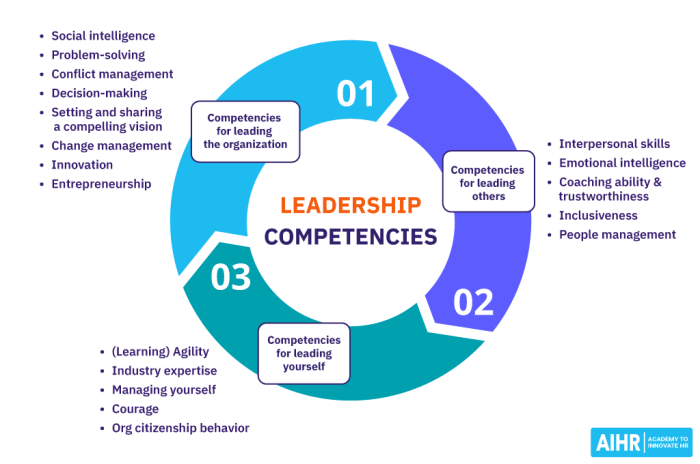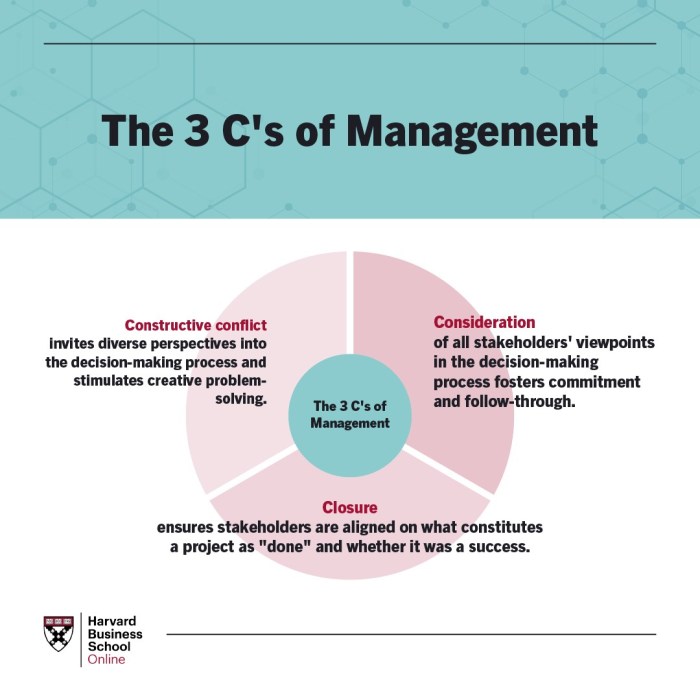Team Management Skills are essential for success in any professional environment. From boosting team performance to ensuring employee satisfaction, these skills play a vital role. Get ready to dive into the world of effective team leadership!
Importance of Team Management Skills
Team management skills are crucial in a professional setting as they play a vital role in ensuring the success of a team and achieving organizational goals.
Impact on Overall Team Performance
- Effective team management can improve communication among team members, leading to better collaboration and coordination.
- Proper delegation of tasks based on individual strengths and skills can enhance productivity and efficiency within the team.
- Setting clear goals and expectations, along with providing constructive feedback, can motivate team members to perform at their best.
Contribution to Employee Satisfaction and Retention
- Strong team management skills can create a positive work environment where employees feel supported and valued, leading to higher job satisfaction.
- Recognizing and rewarding team achievements can boost morale and increase employee engagement, reducing turnover rates.
- Implementing effective conflict resolution strategies can help maintain a harmonious work atmosphere and prevent misunderstandings from escalating.
Key Components of Team Management Skills

Effective team management skills encompass various essential components that contribute to the success of a team. Communication, conflict resolution, and decision-making are key aspects that play a vital role in ensuring smooth operations and productivity within a team.
Communication in Team Management
Effective communication is crucial in team management as it fosters collaboration, builds trust among team members, and ensures clarity in roles and responsibilities. Clear and open communication channels help in conveying ideas, addressing issues, and sharing feedback effectively. Team leaders must be adept at both listening to team members and articulating their thoughts clearly to maintain a positive working environment.
Conflict Resolution in Team Management
Conflict is inevitable in any team setting, but how it is managed can make a significant difference in team dynamics. Team managers must possess strong conflict resolution skills to address disagreements, misunderstandings, and differing opinions constructively. By encouraging open dialogue, active listening, and finding common ground, conflicts can be resolved amicably, leading to stronger team cohesion.
Decision-Making in Team Management
Effective decision-making is another crucial component of team management skills. Team leaders need to make timely and well-informed decisions that align with the team’s goals and objectives. Involving team members in the decision-making process can promote ownership and commitment to the outcomes. Additionally, understanding the impact of decisions on the team and being willing to adapt based on feedback are essential for successful team management.
Developing Team Management Skills

Improving team management skills is crucial for effective leadership and successful project outcomes. Here is a step-by-step guide on how individuals can enhance their abilities in managing teams:
1. Continuous Learning and Development
- Attend workshops, seminars, and training programs focused on leadership and team management.
- Read books, articles, and research papers on effective team management strategies.
- Seek feedback from mentors, colleagues, and team members to identify areas for improvement.
2. Communication Skills Enhancement
- Practice active listening to understand team members’ perspectives and concerns.
- Improve clarity and conciseness in conveying instructions, feedback, and expectations.
- Utilize different communication channels effectively, such as face-to-face meetings, emails, and virtual platforms.
3. Conflict Resolution Training, Team Management Skills
- Learn strategies for managing conflicts within teams and mediating disputes professionally.
- Practice empathy and emotional intelligence to handle sensitive team dynamics with care.
- Implement conflict resolution techniques to maintain a harmonious team environment.
4. Leadership Development
- Identify and cultivate leadership qualities such as decisiveness, resilience, and accountability.
- Delegate tasks effectively, empowering team members to take ownership of their responsibilities.
- Inspire and motivate the team through positive reinforcement and recognition of achievements.
5. Adaptability and Flexibility
- Embrace change and uncertainty by staying adaptable to evolving project requirements.
- Encourage innovation and creativity within the team to overcome challenges and seize opportunities.
- Remain flexible in decision-making processes to accommodate diverse perspectives and ideas.
Strategies for Fostering a Positive Team Culture
To create a supportive and collaborative team environment, managers can implement the following strategies:
- Encourage open communication and transparency within the team.
- Promote trust and respect among team members through active listening and empathy.
- Celebrate achievements and milestones to boost morale and team spirit.
- Provide opportunities for professional growth and skill development through training programs and mentorship.
Training Programs for Enhancing Team Management Skills
There are various training programs and workshops designed to enhance team management skills, such as:
- Leadership Development Workshops
- Conflict Resolution Training Programs
- Effective Communication Seminars
- Team Building Retreats and Activities
Challenges in Team Management: Team Management Skills
Managing a team comes with its own set of challenges that leaders need to navigate effectively in order to ensure success. Whether it’s dealing with conflicts, communication issues, or maintaining motivation, there are various obstacles that can arise in team management.
Common Challenges Faced by Leaders
- Conflict Resolution: Handling disagreements and conflicts among team members.
- Communication Breakdowns: Ensuring clear and effective communication within the team.
- Team Motivation: Keeping team members engaged and motivated to achieve goals.
- Time Management: Balancing deadlines and priorities to ensure efficient workflow.
- Delegation: Assigning tasks effectively and managing workload distribution.
Managing Virtual Teams vs. In-Person Teams
- Virtual Teams: Challenges include lack of face-to-face interaction, potential for miscommunication, and difficulty in building trust.
- In-Person Teams: Challenges may involve conflicts arising from personal interactions, distractions in a physical workspace, and difficulties in managing diverse personalities.
Strategies for Overcoming Obstacles
- Encourage Open Communication: Create a culture where team members feel comfortable expressing their thoughts and concerns.
- Set Clear Expectations: Define roles, responsibilities, and goals clearly to avoid misunderstandings.
- Provide Training and Development: Offer opportunities for skill-building and professional growth to enhance team performance.
- Build Trust: Foster a supportive and collaborative environment where trust can flourish among team members.
- Lead by Example: Demonstrate effective leadership qualities and behaviors to inspire and motivate the team.